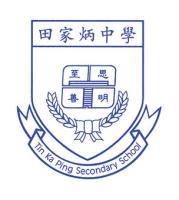| Language Policy |
EMI teaching has been adopting in all forms in our school (except Chinese Language, Chinese History, Chinese Literature, Putonghua, Life Education, Citizenship and Social Development, PE(DSE)). To create a positive English learning environment, various English learning activities are organized regularly to allow students to use English effectively in different contexts. Some of the afternoon assemblies and announcements are delivered in English. Co-curricular activities such as Tinspiration (An English anthology produced by students), English drama, and those organized by English Society give students more opportunities to practise English. English overseas study tour is organized every year so that students are provided with greater exposure in English speaking environment to lay a good foundation in English. Teachers of all subjects adopt cross-curricular teaching and learning approaches, and strategically promote the English Supplementary Reading Scheme. The introduction of cross-subject English Study Modules enhances students' confidence in learning English. |
| Learning and Teaching Strategies |
Emphasis is laid on students' learning attitude, learning skills and learning effectiveness. Teachers make good use of IT facilities in their lessons. We especially stress the teaching of Chinese Language, English Language, Mathematics and Liberal Studies, which are the fundamental subjects for students. Moreover, by adopting Life and Society, Life Education and Co-curricular activities, students' generic skills, basic subject knowledge and learning skills can be enhanced. |
| School-based curriculum |
1. Electives: 3X. Senior forms students study 3 electives.<br> 2. Curriculum highlights: Students will be encouraged to practice through participation in both internal and external competitions pertinent to their interests and abilities, thereby bringing their talents into full play and stretching their potential. Curricula will be tweaked while collaborative teaching will be conducted to cater for the learner diversity. Furthermore, after-school activities such as web-based learning project, enhancement classes, strive-for-improvement classes, junior form English bridging classes and overseas study tours will be arranged with a view to broadening students' horizons, enhancing their interest in learning, and refining their learning outcome. |
| Approach to Catering for Learner Diversity |
We adopt whole-school approach and dual class-teacher system to cater for individual differences of students. Meanwhile, we provide remedial tutorial programmes systematically in junior forms for three major subject studies, viz. Chinese, English, and Mathematics, to supplement students’ learning and enhance their learning effectiveness. Moreover, constructivist and co-operative learning, which has been implemented recently, is also an effective method to cater for learner diversity. |
| Approach to Integrated Education |
We have an Inclusive Education Unit to facilitate the SENs-related work in a whole-school approach. We help the SENs integrate into campus life and prepare them for careers by enhancing their learning capacity, social skills, expression and linguistics training etc. The work includes evaluation by the educational psychologists from the EDB, a tailored study plan for students in need, group training, peer counseling, career guidance, outreach activities and so on. |
| Education Support for Non-Chinese Speaking (NCS) Students |
|
| Home-School Co-operation |
Liaison with parents: Through close collaboration with parents, our school provides an all-round education for students, establishes a firm platform for teaching at school and encourages the active participation of parents as volunteers, who know and serve our school. |
| School Ethos |
Discipline & guidance are inseparable to establish a disciplined school life and a good teacher-student relationship. Student organizations are set up to enhance communication among students. |
| School Development Plan |
We implement Self-directed Learning (SDL) school-wide and adopt Constructivist and Co-operative Learning (CCL) for S.1 - S.2 students in four main subjects, namely, Chinese Language, English Language, Mathematics and Life and Society. According to researches Co-operative Learning is an effective way to enhance students’ learning. Students learn interactively from one another as they come with different backgrounds, personalities and learning abilities. And they learn from others’ viewpoints by helping each other, consolidate learning and reflect on what has been taught. Mutually benefited through cooperative learning, students show a raised learning interest and deepened understanding of concepts.<br>In carrying out SDL this year, we will focus on reinforcing students’ lesson preparation, thereby enhancing the effectiveness of classroom instruction. We will optimize collaboration among students through building up Highly Effective CL Base Groups. With regard to teaching, we will put effort to train up seed teachers so that they can facilitate CCL implementation in their subjects and coach other teachers to further acquaint themselves with SDL concepts. Teaching exchange among staff is thus expected with an eye to sharpening one another’s teaching skills. Furthermore, we will continue to optimize the curriculum of junior forms in order to achieve better bridging with that of senior forms. To further improve the efficiency in SDL of students, QEF has aided, to setup a 'SDL room' and Online learning resource bank.<br>In addition, we implement e-Learning and Enriched IT Programme to equip our students with in-depth IT knowledge so that they can be prepared for the demand of a digitized Hong Kong. |
| Teacher Professional Training and Development |
Most teachers have received professional training in teaching and most of them are continuing their studies. |
| Life-wide Learning |
There are more than 50 different co-curricular activities in various aspects for students. Professional tutors are responsible for leading some of the activities. In addition, there is a Chinese Culture Awarding Scheme which helps promote and develop appreciation of Chinese Culture to students. |
